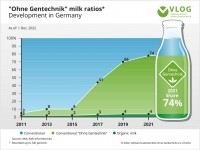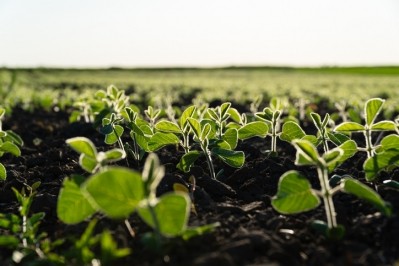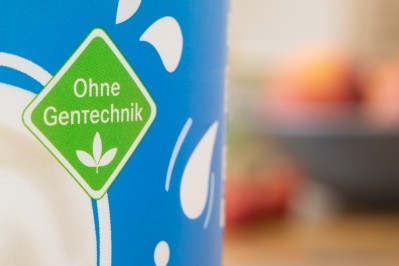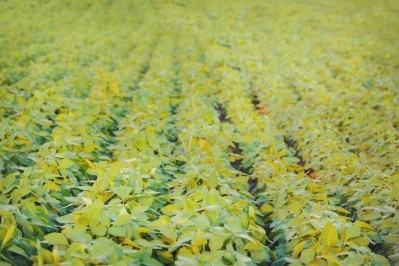German market robust but fall off in demand for non-GMO meal in other European countries

Almost four out of five liters of milk in Germany are produced from cows fed non-GMO feed - the share is now almost 80%. Ten years ago, it was only 5%, reported the German Association for Food without Genetic Engineering (VLOG) this month.
GMO-free milk has largely gone from being a niche product to becoming the standard in Germany, said the organization.
Milk and other food of animal origin adhering to VLOG’s ‘Ohne Gentechnik’ standard means that they have been produced without the use of genetically modified (GM) feed. In 2021, 74% of milk in Germany complied with that standard, and another 4.3% was organic milk, which likewise excludes the use of GM feed, making a total of 78.3% of milk in that market GMO-free, said VLOG.
Asked whether Germans would likely continue to prize non-GMO food products or whether they might begin to prioritize affordability, a spokesperson for VLOG told us: “German consumers are not really faced with this purchase decision as the market segments in which non-GMO labelling is strong have switched their supply for the most part. Measured in terms of end consumer prices, the cost of non-GMO production plays only a minor role.”
Declining prices
In terms of the current cost and availability of non-GMO feed ingredients, she said prices have been declining over the past year, and supply is looking robust. “Prices for soybean and rapeseed meal have fallen significantly since March.”
And the outlook, especially for the non-GMO soybean acreage in Brazil, as per a recent ProTerra forecast, is also very good, said the VLOG representative.
The state of Mato Grosso is the largest producer of non-GMO soybeans in Brazil, yielding nearly 50% of the national production, and it is set to increase its non-GMO soy production by 34% over last year.
Forecasts for soy production in Ukraine, Europe
Looking to crop figures, the Donau Soja association's market outlook for November shows the estimate for soy production in Ukraine has been revised upwards, by 300,000 tons, to 3.6m tons for 2022. “The upward revision was mainly driven by the liberation of areas from the Russian occupation over the recent months.”
Soybean output in Europe overall is likely to grow by 3.8% to 10m tons in 2022, as per that same data source.
In terms of exports for 2022, Ukraine, up until mid-November, had exported around 1.2m tons of soybeans, with 58.5% of those volumes via ports, 21% via railroad, 19.5% via trucks and 1% via barges, reported Donau Soja.
Lower demand for non-GM meal
Nevertheless, that market outlook shows while there is sufficient availability of non-GM meal in all locations, the declining trend in non-GM soymeal premiums is a result of lower demand in Europe.
The non-GM HP soymeal premium moved to around €130/t in November, a level 55% lower than the recent peak, in March 2022.
The Donau Soja report sees a decline in demand for non-GM meal in Belgium, in the Netherlands, in Croatia, and in Italy, with the authors highlighting that Germany remains the only country in the EU not reducing the volumes of non-GM labelled products at the retail level.
What are the reasons for that reduced consumption? Well, for one, livestock populations have been drastically reduced due to lower profitability, said the authors.
Furthermore, on the demand side, they see a significant level of Avian influenza (AI) across Europe, which they said is also making feed compounders very cautious.
Moreover, they believe that buyers of non-GM meal are simply waiting for the premium to hit rock bottom, after several years of painfully high premiums.
"On top of this, we are expecting a [buoyant] non-GM Brazilian soybean crop and Indian non-GM meal available at a very aggressive price. So why should the consumers left in the market be in a rush to buy?"
But also on the horizon, according to the report, is a reduction in European crush output, which could temper further price drops: “Soybean crushing will decrease in Europe due to high energy costs. Several EU plants already announced a shutdown in October.”
Replacement of soy in rations
The Donau Soja outlook also identified another trend: soy is increasingly being replaced by other proteins and DDGs in non-GMO feed formulations.
“Incorporation of soymeal will probably be at 50-75% of the previous year’s level. The rapeseed meal price is low enough to replace soybean meal.
“Some market players expect that the non-GMO soymeal demand will decrease by 10-20% in Germany this season. This drop is likely to be -20% in Austria, Italy, and France and close to -40-50% in the Czech Republic, Slovakia, and Poland.”













